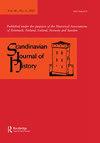The rise and fall of ‘propaganda’ as a positive concept: a digital reading of Swedish parliamentary records, 1867–2019
IF 0.8
3区 历史学
Q1 HISTORY
引用次数: 2
Abstract
ABSTRACT Based on digital readings of all records from the Swedish parliament 1867–2019, we examine how the concept ‘propaganda’ was used in the debates. To track the concept, we have extracted word window co-occurrences, bigrams, and keywords. Research on the history of propaganda in liberal democracies has emphasized that the meaning of the concept was open-ended before WWI. By 1945, it had been contaminated by authoritarian propaganda, and its negative connotations were cemented at least by the 1960s. Our analysis, however, shows that ‘propaganda’ was used mainly in a negative sense from 1867 to 2019. Nevertheless, it was also possible to use ‘propaganda’ in a positive and neutral sense between the 1910s and 1980s. We suggest that a period of de-ideologization in Sweden post-WWII made it possible to use ‘propaganda’ as long as the issues were seen as non-controversial. The radicalization in the late-1960s meant that authorities and previously non-controversial issues became contested. To suggest one-directional ‘propaganda’ in order to implement what politicians had decided was in people’s best interest became difficult in this context. In this new communication setting, ‘information’ was a more flexible term in contexts where ‘propaganda’ had previously been used in a neutral or positive sense.“宣传”作为一个积极概念的兴衰:瑞典议会记录的数字阅读,1867-2019
基于瑞典议会1867-2019年所有记录的数字读数,我们研究了“宣传”这个概念是如何在辩论中使用的。为了跟踪这个概念,我们提取了单词窗口共现、双元图和关键字。对自由民主国家宣传史的研究强调,在第一次世界大战之前,这个概念的含义是开放式的。到1945年,它已经被威权主义宣传所污染,至少到20世纪60年代,它的负面含义得到了巩固。然而,我们的分析表明,从1867年到2019年,“宣传”主要用于负面意义。然而,在20世纪10年代到80年代之间,也可以用积极和中立的意义来使用“宣传”。我们认为,二战后瑞典的一段去意识形态化时期,使得只要问题被视为无争议的,就有可能使用“宣传”。20世纪60年代末的激进化意味着当局和以前没有争议的问题变得有争议。在这种情况下,为了实现政客们所决定的符合人民最佳利益的东西,提出单向的“宣传”变得很困难。在这种新的传播环境中,“信息”是一个更灵活的术语,而“宣传”以前是在中立或积极的意义上使用的。
本文章由计算机程序翻译,如有差异,请以英文原文为准。
求助全文
约1分钟内获得全文
求助全文
来源期刊

SCANDINAVIAN JOURNAL OF HISTORY
HISTORY-
CiteScore
1.10
自引率
20.00%
发文量
33
期刊介绍:
Scandinavian Journal of History presents articles on Scandinavian history and review essays surveying themes in recent Scandinavian historical research. It concentrates on perspectives of national historical particularities and important long-term and short-term developments. The editorial policy gives particular priority to Scandinavian topics and to efforts of placing Scandinavian developments into a larger context. Studies explicitly comparing Scandinavian processes and phenomena to those in other parts of the world are therefore regarded as particularly important. In addition to publishing articles and review essays, the journal includes short book reviews. Review essay proposals and polemical communications are welcomed.
 求助内容:
求助内容: 应助结果提醒方式:
应助结果提醒方式:


